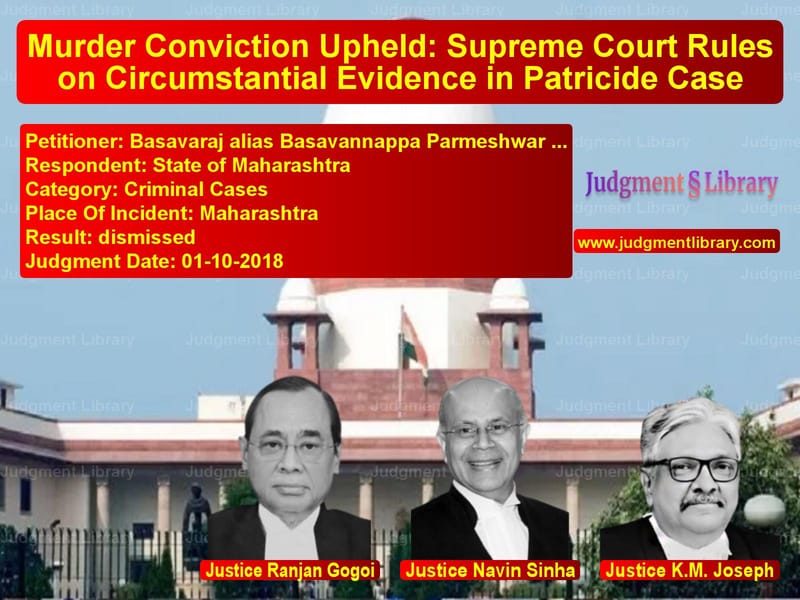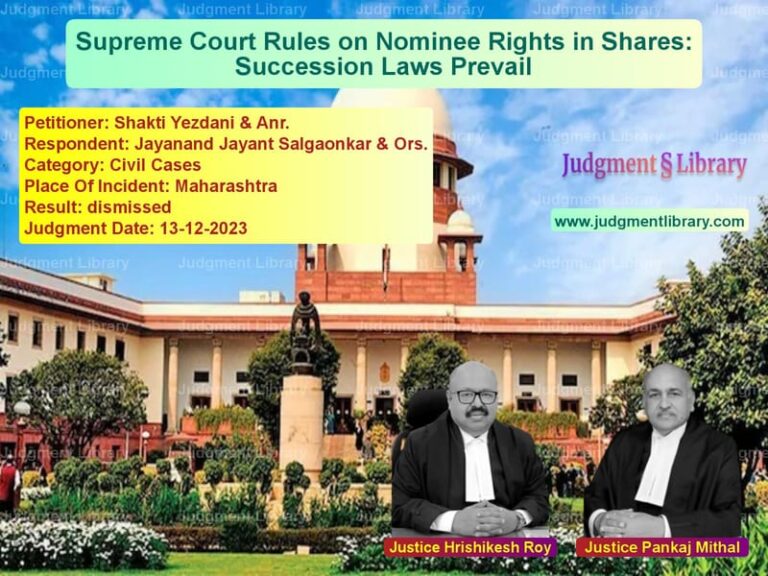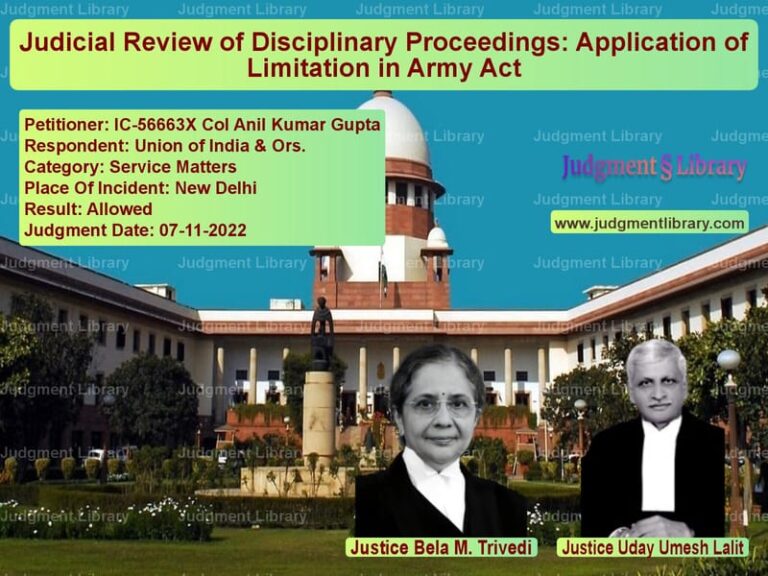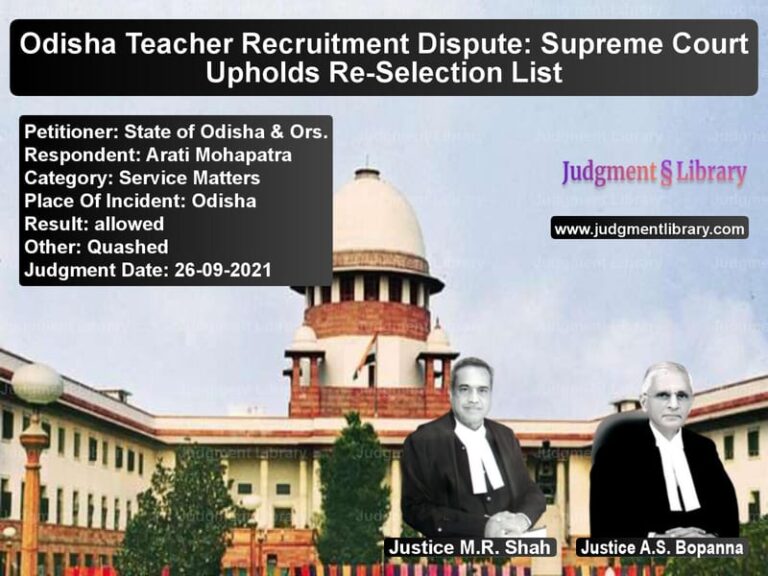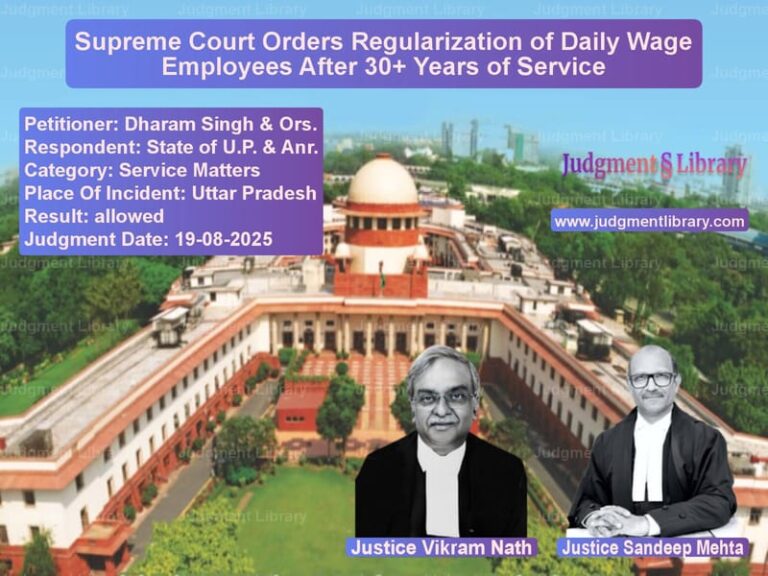Murder Conviction Upheld: Supreme Court Rules on Circumstantial Evidence in Patricide Case
The Supreme Court of India recently upheld the conviction of the appellant, Basavaraj alias Basavannappa Parmeshwar Bangargir, for the murder of his father. The case was based on circumstantial evidence, with no direct witnesses to the crime. The appellant was sentenced to life imprisonment under Section 302 of the Indian Penal Code (IPC). The judgment provides significant insights into the role of circumstantial evidence in criminal convictions.
Background of the Case
The incident occurred on the night of December 1, 2003, in Maharashtra. The deceased, the father of the accused, had gone to his agricultural fields at night and did not return the following morning. His body was later discovered with multiple deep incised wounds on the scalp, face, and neck.
The police report was lodged the next morning by the victim’s other son, PW-2, Ratanchand. The prosecution claimed that the accused harbored a grudge against his father over property disputes and had a history of alcohol addiction. The case against him was built entirely on circumstantial evidence.
Key Issues Raised
- Was the conviction justified based purely on circumstantial evidence?
- Did the prosecution establish a clear and conclusive chain of evidence linking the accused to the crime?
- Was the appellant’s conduct, such as absconding and missing his father’s funeral, sufficient to infer guilt?
Arguments of the Petitioner (Basavaraj)
- The defense argued that the conviction was based on mere suspicion and conjecture.
- No direct evidence linked the appellant to the murder.
- The prosecution failed to establish a conclusive chain of evidence.
- There was no forensic proof connecting the appellant to the crime scene.
- No motive was firmly established for why the appellant would kill his father.
Arguments of the Respondent (State of Maharashtra)
- The prosecution contended that the appellant had a history of disputes with his father regarding agricultural land.
- Witness testimonies established that the appellant had gone to the fields where the deceased was last seen.
- The accused’s clothes, recovered from his friend’s dairy, were found to have bloodstains matching the victim’s.
- The appellant had absconded after the crime and did not attend his father’s funeral, which was considered suspicious behavior.
- A witness (PW-8) confirmed seeing the appellant in the fields with an axe, the suspected murder weapon.
Supreme Court’s Analysis
The Supreme Court upheld the principles of circumstantial evidence as established in previous judgments. It reiterated that for a conviction based on circumstantial evidence, three key tests must be satisfied:
- The circumstances from which an inference of guilt is drawn must be cogently and firmly established.
- The circumstances should have a definite tendency, unerringly pointing toward the guilt of the accused.
- The circumstances, taken cumulatively, should form a complete chain, ruling out any conclusion other than that the crime was committed by the accused.
The Court observed that:
- The motive was established due to a long-standing dispute over agricultural land.
- PW-2 and PW-8 provided consistent testimonies placing the accused in the vicinity of the crime.
- The accused’s bloodstained clothes were recovered and confirmed by forensic reports.
- The appellant failed to provide an alternative explanation for the presence of blood on his clothes.
- The act of absconding and not attending his father’s funeral was an additional incriminating factor.
Final Judgment
The Supreme Court dismissed the appeal and upheld the conviction and life sentence. The Court ruled:
“The appellant had gone to the agricultural fields where the deceased had gone at night. The lands of PW-8 were adjacent to that of the deceased. The evidence of the witness conclusively establishes the presence of the appellant in the agricultural fields. No explanation has been offered by the appellant with regard to the presence of blood on his clothes.”
The Court further noted:
“The conduct of the appellant in absconding till he was arrested, and abstaining during the funeral rites of his father, was completely contrary to normal human conduct, and is therefore considered an additional incriminating factor against the appellant.”
Implications of the Judgment
The ruling provides a crucial precedent in cases relying on circumstantial evidence. Key takeaways from the judgment include:
- Establishing Motive: Even if not essential for conviction, motive strengthens the prosecution’s case.
- Value of Circumstantial Evidence: A well-established chain of circumstantial evidence can lead to a conviction even in the absence of direct witnesses.
- Behavioral Indicators: Acts such as absconding or avoiding funerals can be considered as contributing to circumstantial evidence.
- Role of Forensic Evidence: The presence of the victim’s blood on the accused’s clothes played a key role in establishing guilt.
This judgment reaffirms that in the absence of direct evidence, a well-constructed case based on circumstantial evidence can be sufficient for conviction. The case sets a benchmark for evaluating similar criminal cases based on indirect evidence.
Petitioner Name: Basavaraj alias Basavannappa Parmeshwar Bangargir.Respondent Name: State of Maharashtra.Judgment By: Justice Ranjan Gogoi, Justice Navin Sinha, Justice K.M. Joseph.Place Of Incident: Maharashtra.Judgment Date: 01-10-2018.
Don’t miss out on the full details! Download the complete judgment in PDF format below and gain valuable insights instantly!
Download Judgment: Basavaraj alias Basa vs State of Maharashtra Supreme Court of India Judgment Dated 01-10-2018.pdf
Direct Downlaod Judgment: Direct downlaod this Judgment
See all petitions in Murder Cases
See all petitions in Attempt to Murder Cases
See all petitions in Bail and Anticipatory Bail
See all petitions in Judgment by Ranjan Gogoi
See all petitions in Judgment by Navin Sinha
See all petitions in Judgment by K.M. Joseph
See all petitions in dismissed
See all petitions in supreme court of India judgments October 2018
See all petitions in 2018 judgments
See all posts in Criminal Cases Category
See all allowed petitions in Criminal Cases Category
See all Dismissed petitions in Criminal Cases Category
See all partially allowed petitions in Criminal Cases Category

